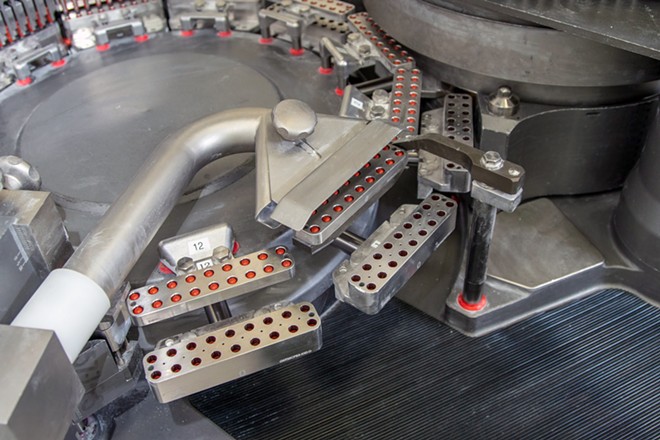
Merck via The New York Times
An undated photo provided by Merck shows the production of its promising COVID-19 treatment, called molnupiravir. Pfizer announced a deal on Tuesday, Nov. 16, 2021, to allow molnupiravir to be made and sold inexpensively in 95 poorer nations that are home to more than half of the world’s population.
By Stephanie Nolen and Rebecca Robbins
The New York Times
DURBAN, South Africa — Pfizer announced a deal Tuesday to allow its promising COVID-19 treatment to be made and sold inexpensively in 95 poorer nations that are home to more than half of the world’s population.
The agreement follows a similar arrangement negotiated by Merck last month, and together the deals have the potential to vastly expand global production of two simple antiviral pills that could alter the course of the pandemic by preventing severe illness from the coronavirus.
“The fact that we now have two manufacturer-anywhere licenses for these two drugs is a big change, and it draws a big contrast with the restrictive licensing so far for vaccines,” said James Love, who leads Knowledge Ecology International, a nonprofit that researches access to medical products.
Under the agreement, Pfizer will grant a royalty-free license for the pill to the Medicines Patent Pool, a nonprofit backed by the United Nations, in a deal that will allow manufacturers to take out a sublicense. They will receive Pfizer’s formula for the drug and be able to sell it for use in 95 developing countries, mostly in Africa and Asia, once regulators authorize the drug in those places. The organization reached a similar deal with Merck for its COVID antiviral pill, molnupiravir, to be made and sold inexpensively in 105 poorer countries.
Nevertheless, there are serious concerns about whether this step will do enough to ensure sufficient supply of the drug for countries that continue to lack COVID vaccines.
Like the Merck deal, the Pfizer agreement excludes a number of poorer countries that have been hit hard by the virus. Brazil, which has one of the world’s worst pandemic death tolls, as well as Cuba, Iraq, Libya and Jamaica, will have to buy pills directly from Pfizer, most likely at higher prices compared with what the generics manufacturers will charge, and those countries risk getting shut out of supplies. China and Russia — middle-income countries that are home to a combined 1.5 billion people — are excluded from both deals, as is Brazil.
This article originally appeared in The New York Times.

